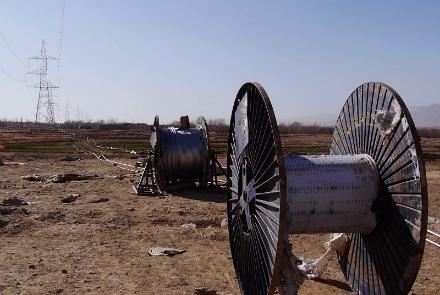Officials from Da Afghanistan Breshna Sherkat (DABS), the country’s power utility company, on Saturday said work on construction of CASA-1000 power project has been delayed for eight months due to some certain reasons including that of financial.
According to DABS Chairman Amanullah Ghalib, the company has not paid the 17 percent of the pre-paid money for the company which has contracted Afghanistan part of the project.
Based on the timeline, work on the project was supposed to kick off by the end of 2018; however, Ghalib said the work will start by the end of 2019.
“The CASA-1000 contract is related to the Tajikistan and Pakistan parts of the project,” Ghalib said. “The signing of contract on installation of substations in Pakistan and Tajikistan in September, the timeline of the project was affected and therefore seven to eight months of delay is expected.”
Analysts said delay in regional projects is a “big damage” for Afghanistan’s economy in coming years.
“When government fails in such big projects, people suffer the main loss,” said Taj Mohammad Talash, an economic affairs analyst.
CASA-1000 is one of the biggest power projects that transfer 300 megawatts of electricity from Tajikistan and Kyrgyzstan to Afghanistan and Pakistan.
The CASA-1000 project will include:
• 500 kV AC line from Datka (in the Kyrgyz Republic) to Sugd-500 (477 kilometers away, in Tajikistan)
• 1,300 megawatt AC-DC Converter Station at Sangtuda (Tajikistan)
• 750-kilometer High Voltage DC line from Sangtuda (Tajikistan) to Nowshera (Pakistan)
• 1,300 megawatt DC-AC Converter Station at Nowshera
CASA-1000 project will start from Kyrgyzstan and it will reach Afghanistan through Tajikistan and onward to Pakistan’s Peshawar city. The length of the project in Afghanistan is estimated to eventually run for 562km.
With the implementation of the project, 1300 megawatts of electricity from Kyrgyzstan and Tajikistan will be transmitted to Afghanistan and Pakistan. Afghanistan will receive 300 megawatts of power and the remaining one thousand megawatts will be transmitted to Pakistan via Afghanistan territory.
The CASA-1000 Project is an important step in building a functioning, efficient electricity system across Central Asia and South Asia. By facilitating clean power export revenues for the Central Asian countries and by alleviating electricity shortages in the South Asian countries, this project will enhance growth prospects across both regions.
This project demonstrates landmark cooperation among the Kyrgyz Republic, Tajikistan, Pakistan, and Afghanistan. The modern and efficient CASA-1000 electricity transmission system will help transform the region and signify an important step toward realizing the planned Central Asia-South Asia Regional Electricity Market (CASAREM).
The CASAREM initiative will help not only these four countries but also improve the electrical systems and develop inter-regional cooperation between Central Asia and South Asia.
Afghanistan will receive between $40 and $50 million in transit duties from the project annually. The project will also enhance the economic connectivity between the contributing nations and will boost Afghanistan’s transit reputation in the region and entire Asia.


